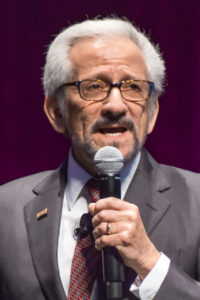
Patient-focused care is the art and the practice of focusing the entire health-care team on the patient. Patient-focused care isn’t taught in medical schools and only rarely taught by mentors; most clinicians learn patient-focused care from patients.
The literature defines patient-focused care in terms of three Cs: communication, continuity of care, and concordance, said Richard S. Irwin, MD, Master FCCP, but he defines patient-focused care through a more personal lens.
“Patient-focused care is the care we would want our own families to receive all of the time,” said Dr. Irwin, Editor in Chief for the journal CHEST®, and Chair of UMass Memorial Medical Center’s Department of Critical Care.
Dr. Irwin discussed his own attitudes toward patients during his Sunday keynote address “My Journey to Patient-Focused Care and Lessons Learned Along the Way.”
Patient-focused care is easy to define by anecdote and expectation. It means, Dr. Irwin noted, that if his 92-year-old mother is 30 minutes late to a medical appointment because of long registration lines, he would hope she would still be seen.
It means that physicians and nurses would always return phone calls as promised.
It means that he would hope that a large practice physician would call his brother-in-law by the proper name regardless of how harried he was feeling that day, and that he would actually put the stethoscope in his ears while listening to his brother-in-law’s heart.
“And patient-focused care is not just for our families,” he said. “It is for all families, everywhere. If you are not sure, you can ask yourself ‘What would I want a provider to do for my child, my parent, my grandchild?’ Very often the answer is patient-focused care. That is a definition that we can all relate to.”
Dr. Irwin graduated from Tufts University School of Medicine in 1968. Like most medical students then and now, he didn’t learn patient-focused care in medical school. Patients were seen as the passive recipients of the care, not the focus.
He also didn’t learn it from his father, an internist in solo practice, because he saw patients taking his father away from family and home.
He learned it from his mother several months after his father died unexpectedly following a massive stroke.
“My mother notified his cardiologist and other physicians, many of whom had cared for him over decades,” Dr. Irwin said. “Not a single one acknowledged his passing. She was furious because in her eyes, it meant that my father, her husband, their patient, had no value to them. Never ever fail to let the patient know how important they are to you and to the entire health-care team.”
Dr. Irwin emphasized that the lesson ‘patients matter’ should begin in medical school. And not just on the formal curriculum. Patient-focused care must be part of the hidden curriculum as well—the unspoken learning that happens when medical students see more experienced clinicians at work.
If students see physicians focusing on patients, they will absorb the lesson that patient-focused care is the way medicine is practiced. If doctors treat patients as less than the focus of care, they will learn that lesson, too.
“I think about patients every day,” Dr. Irwin said. “And if there is ever any doubt about the right thing to do, I think about what I would want to be done for my own family.”





